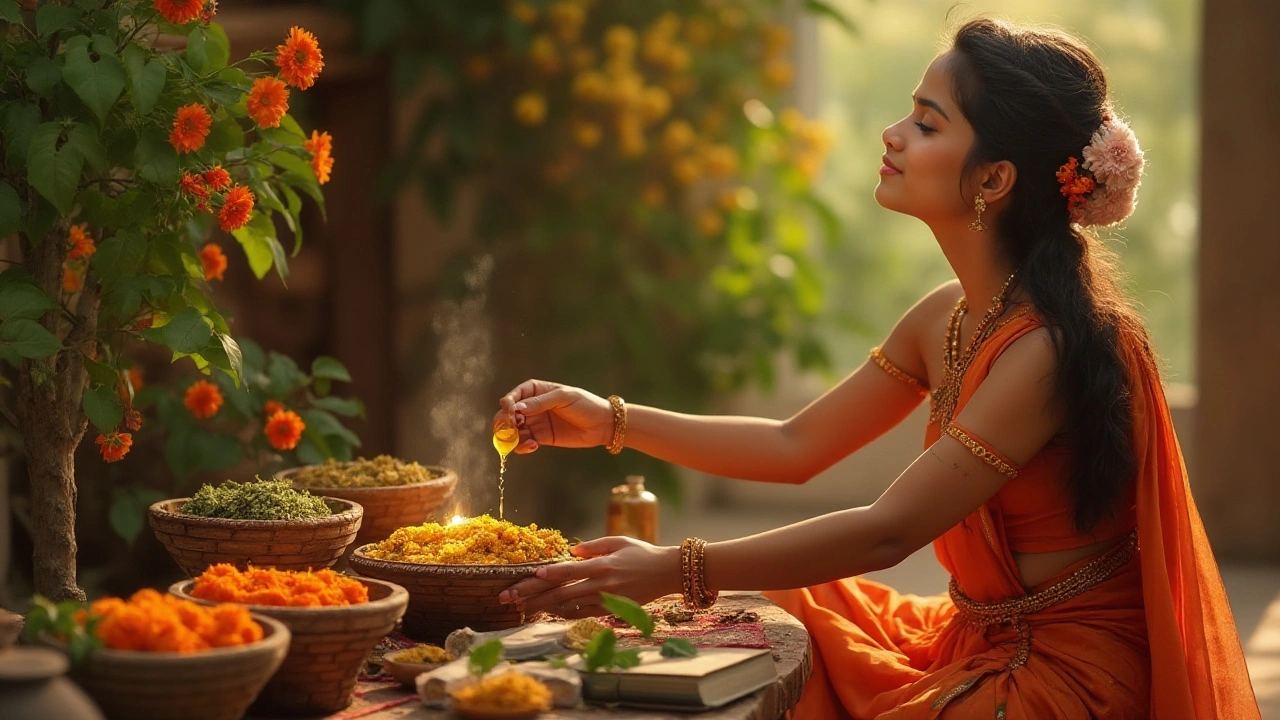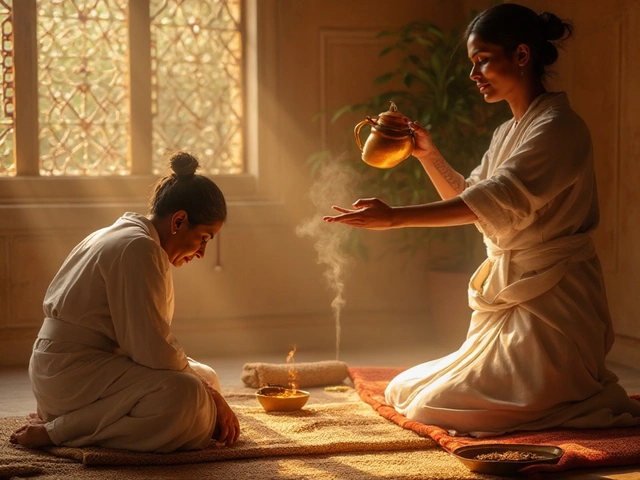For centuries, Ayurveda has captivated many with its holistic approach to health and wellness. Among its many promises, the prospect of rejuvenating hair through natural means holds particular allure for those grappling with hair loss.
Hair, a symbol of vitality and beauty, often suffers due to stress, dietary imbalances, or genetic predispositions. In this exploration, we aim to understand whether the ancient wisdom of Ayurveda can offer genuine solutions for hair regrowth.
Dive into this article as we navigate through time-honored traditions, herbal concoctions, and lifestyle adjustments that Ayurveda suggests could potentially revitalize your scalp and boost hair health.
- Understanding Ayurveda and Hair Health
- Herbal Remedies for Hair Regrowth
- Ayurvedic Diet for Stronger Hair
- Stress and Hair Loss: Ayurvedic Approaches
- Evidence and Testimonials
Understanding Ayurveda and Hair Health
Ayurveda, a system of medicine rooted in India over 5,000 years ago, approaches health by harmonizing the body with the environment, aiming for balance among its three key energies or doshas: Vata, Pitta, and Kapha. Each of these doshas influences not just our physical health but also the quality and vitality of our hair. It’s believed that an imbalance in Pitta, in particular, might lead to issues such as hair thinning and early graying, as Pitta governs metabolism and body heat, influencing hair's health and growth.
The emphasis Ayurveda places on holistic healing means that hair health isn't just about external applications; rather, there's a strong focus on diet, lifestyle, and managing stress. From ancient texts like the Charaka Samhita to practices passed down through generations, Ayurveda offers a multifaceted approach to nurturing hair. In Ayurveda, the scalp is seen as fertile ground where healthy hair can flourish naturally. Massaging the scalp with herbal oils infused with ingredients such as Bhringraj, Amla, and Brahmi has traditionally been recommended to nurture both the scalp and hair follicles.
Nourishment isn’t just about topical treatments; it’s about what you choose to consume. Ayurvedic principles suggest incorporating a balanced diet filled with fresh fruits, leafy greens, and essential nutrients to encourage stronger, more resilient hair. It recognizes diet as a fundamental pillar that can support or undermine hair vitality. In addition, stress impacts hair health significantly, and Ayurveda underscores managing stress through mindfulness techniques like yoga and meditation to maintain your inner and outer vitality.
Hair regrowth is a journey influenced by several internal and external factors, and Ayurveda encourages patience and consistent practice. A 2011 study in the Asian Journal of Pharmaceutical and Clinical Research investigated herbal formulations and highlighted Ayurveda's focus on the natural management of common hair issues, noting that herbal remedies such as these have flourished across various cultures due to their affordability and low risk of adverse effects.
As we embrace these practices, it is also beneficial to remember that while Ayurveda offers a rich tapestry of knowledge on hair health, individual responses can vary. Consulting an Ayurvedic practitioner might help tailor the approach to your personal dosha, ensuring a holistic path to healthier hair.
“In the Ayurvedic view, hair is a byproduct of bone formation, and the tissue responsible for bone formation also plays a role in hair growth. Therefore, Adequate nutritional food intake is directly related to good bone nutrients, which lead to the nourishment of the hair.” - The Ayurvedic Institute
Herbal Remedies for Hair Regrowth
The world of Ayurveda is rich with herbal remedies that promise to invigorate the scalp and stimulate hair growth. These age-old solutions, harnessed from nature, have been passed down through generations. Ingredients like Bhringraj, often called the 'King of Herbs', and Amla, known for its rich vitamin C content, are cornerstones in this natural repertoire. Bhringraj is celebrated for its potential to darken hair, prevent premature greying, and strengthen hair follicles. Meanwhile, Amla's high antioxidant content is said to rejuvenate hair, prevent dandruff, and improve blood circulation, nourishing the scalp. It's fascinating how these plants, deeply rooted in the geographic heartlands of India, bear the power to potentially alter the course of modern hair care through ancient wisdom.
Interestingly, many Ayurvedic practitioners suggest using a blend of herbal oils as a regular part of one's hair care routine. A combination of oils like coconut, sesame, and almond serves as a base, infused with potent herbs like Brahmi, Ashwagandha, and Neem. The concoction is massaged into the scalp, said to enhance circulation and nourish the roots deeply. This endeavor is not just about addressing hair loss, but it also encourages a mindful self-care routine, which many believe directly influences stress levels—another common cause of hair loss. "The influence of herbal oils in promoting a healthy scalp is immense," notes Dr. Pratima Raichur, a known figure in Ayurvedic dermatology.
"Their effects, coupled with a calming massage technique, create a nurturing environment for hair regrowth," she explained in an interview with a wellness journal.
A useful way to incorporate these remedies is by preparing a hair mask at home, a popular practice for many seeking natural remedies. A typical recipe might include a paste made from Methi (fenugreek) seeds known for their hormone regulatory properties, alongside yogurt which acts as a natural conditioner. This mixture should be left in the hair for about 30-45 minutes before washing it off. Regular use of such masks might condition the hair strands, potentially thickening them and lending a visible sheen. The simplicity of these treatments reflects their accessibility, making them suitable for anyone looking to explore Ayurveda without significant investments.
Among the many lesser-known remedies is the use of Hibiscus flower extracts, which some claim can help regrow bald patches and repair split ends. The mucilaginous nature of Hibiscus is thought to act as a natural emollient, which might soothe the scalp and retain moisture. In combination with regular application of herbal dyes sourced from ingredients like Henna, not only can hair growth be stimulated, but it also adds a natural tint that's both safe and aesthetically pleasing. The holistic approach that Ayurveda takes also includes incorporating such remedies into one's daily rituals, sustainably integrating them with modern life without the side effects often associated with synthetic products.

Ayurvedic Diet for Stronger Hair
The role of diet in maintaining both the body and mind is a cornerstone of Ayurvedic philosophy, and **hair regrowth** is no exception. Imagine your hair as a garden. Just like any garden, the soil needs to be fertile and nourished for the plants to grow. In Ayurveda, Ahara (diet) plays a crucial role in influencing the three doshas—Vata, Pitta, and Kapha—that dictate our physiological health. By balancing these doshas through specific dietary choices, it's believed you can foster an environment conducive to hair strengthening and regrowth.
One of the primary components in an Ayurvedic diet aimed at enhancing hair health involves the regular consumption of balanced proportions of protein, vitamins, and minerals. Foods rich in protein like lentils, beans, and lean meats are encouraged to provide the necessary building blocks for hair. Additionally, green leafy vegetables, which are high in iron and calcium, not only support bodily functions but are also vital for maintaining strong and healthy *hair follicles*. The consumption of healthy fats found in nuts and seeds such as almonds, flaxseeds, and sesame seeds is emphasized too. These sources of omega-3 fatty acids are known to improve hair elasticity and prevent breakage.
This traditional approach also highlights the inclusion of specific herbs and spices in meals to facilitate better digestion and nutrient absorption. Turmeric and ginger, with their anti-inflammatory properties, can help mitigate hair fall induced by inflammatory reactions in the body. Meanwhile, the creamy and rich texture of ghee acts as a substitute for oil, promising internal lubrication and improved nourishment to hair from within. Ayurveda also recommends keeping the body hydrated with warm water, as it is believed to aid digestion and ensure better assimilation of nutrients.
In addition to a balanced diet, Ayurveda urges us to pay attention to our body’s reaction to different foods. For instance, certain individuals may find that dairy products cause mucus build-up or inflammation, which can potentially exacerbate hair loss related problems. Hence, being mindful of food sensitivities and opting for alternatives can be vital. Incorporating a seasonal diet—one that aligns with the natural rhythm of seasons—can also be especially beneficial. As the seasons change, so do our bodily requirements, and adjusting our diet accordingly helps in maintaining doshic balance, paving the way for healthier hair.
"Ayurveda teaches that health is not just the absence of disease, but a balance of body, mind, and spirit. By eating with awareness and in tune with our unique dosha constitution, we lay the groundwork for enduring health and beautiful hair," says Dr. Vasant Lad, founder of The Ayurvedic Institute.
To sum up, an Ayurvedic perspective on dieting for hair health involves more than just eating the right foods; it is about fostering a harmonious relationship with oneself and nature through the conscious selection of what you consume. When approached earnestly, these dietary adjustments can lead not only to stronger hair but also to improved overall well-being. By understanding and embracing these principles, individuals can potentially experience positive changes, reflecting both externally through their hair and internally through their health.
Stress and Hair Loss: Ayurvedic Approaches
Stress is often called the silent culprit behind a myriad of health issues, and hair loss is no exception. It's alarming how our fast-paced lifestyles have exacerbated stress-related problems, including the thinning of hair. From an Ayurvedic viewpoint, stress is seen as an imbalance in one’s dosha, particularly Vata. This disturbance not only affects mental peace but also physical attributes such as hair health. Understanding this connection, Ayurveda offers an array of remedies focusing on restoring balance to the body and mind.
One of the cornerstones of Ayurveda is its emphasis on the mind-body connection. Techniques such as yoga and meditation are highly recommended to mitigate stress. These practices help in not only calming the mind but also improving blood circulation and enhancing hair strength. Ayurveda often suggests daily meditation sessions as a way to harmonize the body's energies, thereby potentially curbing hair regrowth challenges exacerbated by stress. A study by the Indian Journal of Psychiatry indicates that regular meditation can significantly lower stress levels, which, in turn, may impact hair health positively.
Herbal interventions play a vital role in the Ayurvedic approach to reducing stress-induced hair loss. Herbs such as Brahmi and Ashwagandha are lauded for their adaptogenic properties, which help the body manage stress better. These herbs can be consumed in various forms, such as teas or supplements. Additionally, Ayurveda suggests using oils infused with calming herbs and spices for a therapeutic scalp massage. Regular oil massage not only nourishes the scalp but also has a deep calming effect, allowing for the body’s natural healing processes to kick in.
"Ayurveda regards the hair and nails as byproducts of bone tissue. Hence, enhancing bone health through diet and stress reduction in Ayurveda is thought to influence stronger and healthier hair growth," writes Dr. Deepak Chopra, a well-known proponent of alternative medicine.
The Ayurvedic diet, rich in natural ingredients, also supports stress alleviation. Foods known for their calming properties, such as almonds, sesame seeds, and leafy greens, are often advised. Such foods have nutrients that bolster the digestive system and enrich hair from the inside out. It’s not just about what you eat but how you eat. Ayurveda stresses mindful eating practices that allow proper assimilation of nutrients, consequently helping in reducing stress and improving hair vitality.
Lastly, ensuring a routine that allows ample rest and rejuvenation is another Ayurvedic principle often neglected in modern living. Quality sleep is paramount, as it is during sleep that the body performs its most efficient repair functions, including those related to hair. Ayurveda offers suggestions like warm baths with luxuriant herbal oils or drinking a glass of warm milk with a pinch of nutmeg before bed, both believed to enhance sleep quality.
Thus, while stress is an inevitable part of life, Ayurvedic practices offer ancient yet ever-relevant methods to potentially mitigate its impact on hair health. By incorporating these practices, one could harmonize their lifestyle and provide their hair the nourishing environment it needs to thrive.

Evidence and Testimonials
Delving into the world of Ayurveda and its impact on hair regrowth unearths a complex tapestry of testimonials, both age-old and contemporary. One cannot underestimate the influence of personal stories when evaluating the efficacy of natural remedies in hair care. Across various forums and traditional Ayurvedic clinics, individuals have shared stories of achieving healthier, thicker hair. These narratives often credit the use of herbal remedies and lifestyle adjustments tailored according to Ayurvedic principles. A common theme in these stories is patience, as Ayurvedic treatments emphasize consistency and allow time for the body's natural healing processes to promote hair rejuvenation.
Scientific evidence supporting Ayurvedic methods for hair regrowth is still burgeoning. Some studies focus on particular ingredients used in Ayurveda. For example, a study published in the Journal of Ethnopharmacology highlighted the benefits of bhringraj (Eclipta alba) in enhancing hair growth activity in animal models. The research demonstrated that this traditional herb increases hair follicles and improves keratin production, which is crucial for maintaining hair strength and vitality. Despite these promising findings, more research involving human participants is necessary to substantiate these claims widely.
Testimonies are not limited to word-of-mouth tales. Some individuals have documented their experiences online, using before-and-after photos to chronicle their journey with Ayurvedic solutions. These visual accounts often highlight the varying pace at which individuals respond to treatments, underlining the personalized nature of Ayurveda. Some people have observed a noticeable reduction in hair fall and improvements in hair texture after using Ayurvedic oils, such as amla (Indian gooseberry) oil. Amla is rich in vitamin C and antioxidants, vital for nourishing hair and scalp health, which makes it a popular choice in Ayurveda hair care practices.
"Using Ayurvedic oils and following a diet rich in natural ingredients has increased my hair volume significantly over six months," says Sima Patel, a 35-year-old yoga instructor, attesting to the tangible difference in her hair.
Consumer surveys, albeit limited, reflect a growing satisfaction rate among users of Ayurvedic hair care products. A small-scale survey conducted by an herbal product review site indicated that 65% of users experienced some form of improvement in hair health after six months of consistent application of Ayurvedic treatments. However, the survey sample was small, and results varied significantly, highlighting the subjective nature of 'improvement' in such a context. The disparity in experiences emphasizes the importance of realistic expectations and the understanding that Ayurveda should complement a healthy lifestyle rather than serve as a sole remedy.
| Ayurvedic Ingredient | Reported Benefit |
|---|---|
| Bhringraj | Enhances hair growth, improves keratin levels |
| Amla | Reduces hair fall, nourishes scalp |
In conclusion, while anecdotal evidence of natural remedies and testimonials regarding Ayurvedic approaches to hair care are abundant, scientific validation is evolving. Many people stand by their choice of Ayurvedic therapies, citing reduced hair loss and increased hair vitality. Nevertheless, prospective users should approach Ayurvedic treatments with measured expectations, considering them a valuable addition to a broader regimen that prioritizes balanced nutrition, adequate hydration, and stress management.





